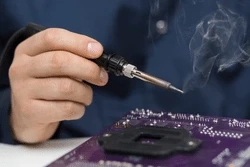Consistency and quality are crucial in the soldering and electronics manufacturing industries. It has become clear that industry standardization is required to manufacture products that meet and surpass customer requirements as electronics get more sophisticated. The products and assemblies become more complex. IPC training is useful in this situation.
Having the correct credentials might help you stand out in the cutthroat electronics market of today. The IPC 620 certification training is one of these credentials. This is crucial for those seeking careers in assembly process engineering, quality assurance supervisors, training managers, and other positions in charge of the dependability and quality of cable and wire harness assemblies.
Utilize your IPC certification to stand out while applying for jobs, being promoted, and advancing your career. With this certification, you can demonstrate your dedication to excellence and industry best practices while also having your expertise validated. Additionally, having an IPC certification can frequently result in improved work possibilities and higher wages, thus emphasizing its significance in your career development.
The IPC is a trade organization with the mission of uniting designers, board producers, assembly businesses, suppliers, and original equipment manufacturers to promote their competitive excellence and monetary success. They could do this by unifying electronic components\' production and assembly requirements within the electronics manufacturing sector.
There are currently four levels of IPC certification, and each level has advantages based on your present expertise and position within your organization. To increase the level of expertise, they are mentioned below.
IPC Specialist (CIS) Certified
Candidates who have earned the CIS certification will have a uniform comprehension of a specific standard\'s design or production requirements. Assemblers, line operators, supervisors, engineers, and quality staff, for instance, would greatly benefit from this level of training and certification if they wanted to increase their knowledge and proficiency within a particular standard utilized in the electronics manufacturing business.
The following IPC Standards are available for certification by Certified IPC Specialists (CIS):
- IPC-A-610 governs the Acceptability of the Electronic Assemblies.
- All the Requirements and Acceptance for Cable Assemblies and Wire Harnessing are covered in the IPC/WHMA-A-620 Certificate and Training.
- The Requirements for Soldering Electrical and Electronic Assemblies are outlined in J-STD-001.
Certified Standards Expert: CSE
A CSE is a subject matter expert with extensive knowledge and comprehension of a particular IPC standard or set of standards. This certification emphasizes a thorough understanding of a specific standard rather than the development of skills, and it is confirmed by rigorous timed examination to show a fluid understanding of the materials. One can obtain certification in several IPC standards, including IPC-A-610, IPC-6012, and J-STD-001.
Candidates granted CSE status have the skills to swiftly and effectively explore the IPC standards, function as subject matter experts on all issues relating to the standard, and relate the standard and their expertise to particular business needs.
Certified IPC Trainer (CIT)
The CIT-level certification is intended for those considering or needing to provide CIS training to others within their organization. This may also apply to instructors at educational and training facilities who must certify students as CISs as a requirement of the curriculum or staff members of Licensed Training Centers who do not meet the requirements to be Master IPC Trainers (MITs). The delivery and administration of CIS-level training and certification tests to candidates for IPC certification are authorized by CITs.
Master IPC Trainer (MIT)
An MIT is regarded as the highest IPC certification level among the four. After completing this advanced IPC course, an MIT can instruct CITs and CISs and offer their learners the initial level of technical and administrative support. MITs may only be employed by Licensed Training Centers. Each IPC program requires a unique MIT credential, and unless otherwise permitted by IPC, the MIT certification is closely linked to a particular employing Training Center.
The four different levels of IPC certification have an apparent distinction between them. The first two certification levels, CIS and CSE, are intended to advance a person\'s knowledge to a certain degree and assist in establishing them as subject matter experts. This is fantastic for soldering operators and technicians seeking jobs in the electrical manufacturing sector. You must be certified to teach an IPC standard to people seeking IPC certification, and you must have either the CIT or MIT levels of certification.
The type of certification you need will mostly rely on your position within the organization and the direction you want to take in your soldering and electronics manufacturing career.
You must learn, get verified and certified, and go through training programs from approved IPC certification institutes if you want to deepen your understanding of a particular standard or if you want to teach a standard inside your organization. They offer classes at convenient times and places for students wishing to advance in their careers through certification and training programs. Suppose you sign up for a soldering school or an IPC certification program. In that case, you\'ll learn the knowledge and abilities you need to be successful in the rapidly growing electronics manufacturing sector.



